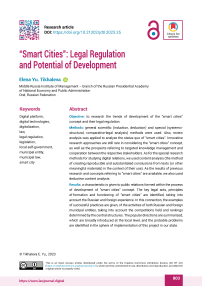“Smart Cities”: Legal Regulation and Potential of Development
Автор: Tikhaleva E. Yu.
Журнал: Journal of Digital Technologies and Law @lawjournal-digital
Рубрика: Государство и право. Юридические науки
Статья в выпуске: 1 (3), 2023 года.
Бесплатный доступ
Objective: to research the trends of development of the “smart cities” concept and their legal regulation. Methods: general scientific (induction, deduction) and special (systemic-structural, comparative-legal analysis) methods were used. Also, review analysis was applied to analyze the status quo of “smart cities”. Innovative research approaches are still rare in considering the “smart cities” concept, as well as the prospects referring to targeted knowledge management and cooperation between the respective stakeholders. As for the special research methods for studying digital relations, we used content analysis (the method of creating reproducible and substantiated conclusions from texts (or other meaningful materials) in the context of their use). As the results of previous research and concepts referring to “smart cities” are available, we also used deductive content analysis. Results: a characteristic is given to public relations formed within the process of development of “smart cities” concept. The key legal acts, principles of formation and functioning of “smart cities” are identified, taking into account the Russian and foreign experience. In this connection, the examples of successful practices are given, of the activities of both Russian and foreign municipal entities, taking into account the competitions held and rankings determined by the central structures. The popular directions are summarized, which are broadly introduced at the local level, and the probable problems are identified in the sphere of implementation of this project in our state. Scientific novelty: the article carries out an analysis of the current legal regulation and the results of introducing the “smart cities” concept. The promising technologies and methods are identified, which are necessary to achieve the tasks of the concept implementation. The elements are specified, which ensure sustainability of “smart cities” complying with the future demands. An author’s position is expressed regarding a close interrelation of this phenomenon with the institute of local self-government in the context of possible development of the latter into the process of making managerial decisions involving artificial intelligence. This concerns, first of all, using the potential of the Internet of Things. In practice, a lot of problems occur, associated with the implementation of normatively stipulated provisions, which implies the need to perform further research in the sphere under study. Practical significance: is due to the insufficient development of data about the features and prospects of introducing the idea of “smart cities”. The provisions of the research performed will allow effectively improving the mechanisms of legal regulation and broad implementation of the concept under study.
Digital platform, digital technologies, digitalization, law, legal regulation, legislation, local self-government, municipal entity, municipal law, smart city
Короткий адрес: https://sciup.org/14127555
IDR: 14127555 | DOI: 10.21202/jdtl.2023.35


